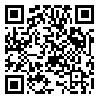BibTeX | RIS | EndNote | Medlars | ProCite | Reference Manager | RefWorks
Send citation to:
URL: http://jrh.gmu.ac.ir/article-1-2341-en.html
2- Department of Psychology, Faculty of Arts & Humanities, Manipal University Jaipur, Rajasthan, India. ,
Background: Childhood trauma encompasses neglect, abuse, abandonment, witnessing abuse, and having mentally ill and/or parent(s) engaged in substance abuse. Survivors of trauma are more likely to report insecure attachment styles. Thus, the current study aimed to investigate the indirect pathways underlying the relationship between childhood trauma and romantic attachment among adults in India.
Methods: This study used a correlational research design and a cross-sectional, survey method for data collection. The data were collected through an online survey in Tier 1 cities in India. A total of 397 responses were collected using purposive sampling, from which 104 respondents were selected after data cleaning. The research tools included the childhood trauma questionnaire–short-form, the experience in close relationship scale, Rosenberg’s self-esteem scale, and trust in close relationships scale. Descriptive and inferential analysis was done using SPSS software, version 25. Pearson correlation coefficient, regression analysis, and mediation analysis were done to analyze data.
Results: The results indicated a high level of trauma in the participants, and consequently, insecure romantic attachment styles, and also low levels of trust at a 0.05 significance level. Self-esteem had a significant negative correlation with romantic attachment (r=-0.225, p=0.001), but did not mediate the relationship between childhood trauma and romantic attachment. Trust also had a significant negative correlation with romantic attachment (r=-0.312, p=0.001) and also mediated the relationship between childhood trauma and romantic attachment (β=0.102, p=0.041).
Conclusion: This study provides evidence that childhood trauma affects romantic attachment, self-esteem, and trust. In light of these findings, therapists should adopt an integrated approach that addresses these interconnected variables through trauma-focused, attachment-focused, and evidence-based therapies to help trauma survivors. Since trust was identified as a mediating factor in the relationship between childhood trauma and romantic attachment, it provides a novel insight for therapists to prioritize interventions that focus on building trust.
Received: 2023/04/18 | Accepted: 2023/05/28 | Published: 2023/08/2
| Rights and permissions | |
 |
This work is licensed under a Creative Commons Attribution-NonCommercial 4.0 International License. |









